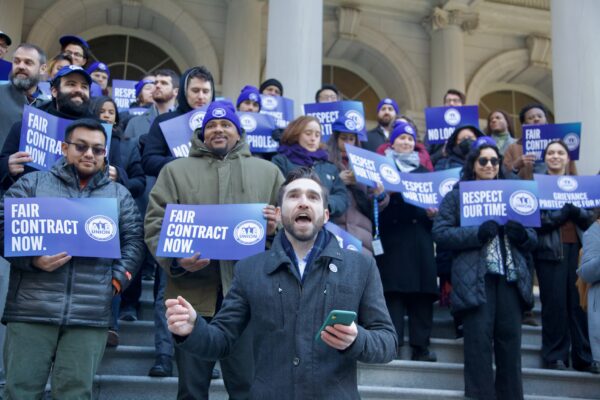Compiled by Steven Wishnia and Neal Tepel
TVA Unions Object to Privatization Study
Buried deep in President Barack Obama’s 2015 budget is a proposal to study privatizing the Tennessee Valley Authority—and the unions representing several thousand TVA workers don’t like the idea. Sean McGarvey, president of the AFL-CIO’s Building and Construction Trades Department, called it “a poorly crafted, poorly intended, never to be realized, budget gimmick that won’t save money, but will cost jobs.” The TVA, a landmark New Deal project, provides low-cost electricity to more than 9 million people in seven Southern states. It hasn’t needed federal operating aid since 1999, but owes about $25 billion on bonds.
McDonald's Sued for Wage Theft
McDonald’s employees filed seven lawsuits March 13 alleging that they are being systematically cheated by being forced to work off the clock and not getting meal breaks or overtime pay. Jason Hughes, a plaintiff who said he’s worked at a McDonald’s in Northern California for about two years, said he’s had to punch out when business is slow, but stay in the store and punch back in as soon as it gets busy. Five of the suits name company franchisees as codefendants. “We believe it is time McDonald’s accepts responsibility for the pay practices at its franchise restaurants,” said Joe Sellers, one of the lawyers representing workers. If the cases are granted class-action status, they could affect more than 30,000 workers.
Vermont Bus Drivers Strike Over Dangerous Schedules
Bus drivers in Burlington, Vermont and the surrounding county went out on strike March 17, charging that their split-shift schedules are onerous and dangerous. “Drivers are calling for a fair contract that treats drivers with respect, avoids increasing driver fatigue and creates livable jobs,” said Teamsters Local 597 member Rob Slingerland, who works from 6:50 to 9 a.m. and from 2:20 to 7:20 p.m., but is paid for only seven hours’ work. The current contract, he says, requires drivers to be available for up to 15 hours a day. The strike vote was unanimous.
UAW to Appeal NLRB Decision on Anti-Union Groups
The United Auto Workers said March 12 it will appeal a National Labor Relations Board official’s decision to let two anti-union groups present arguments against its bid to get a new election at the Volkswagen plant in Tennessee. It’s asking the full NLRB to overrule a decision by the Atlanta regional director that granted the National Right to Work Foundation and Southern Momentum standing to intervene. The UAW charges that the two groups, who “openly republished the illicit threats in the media and among the Volkswagen workforce,” were among the outsiders whose interference prevented a fair election.
Portland City Workers Vote to Strike
After city officials in Portland, Oregon, rejected a contract offer by the District Council of Trade Unions on March 14, the two biggest unions in the coalition representing 1,600 city workers voted to authorize a strike. Laborers Local 483 did later that night, and AFSCME Local 189 members followed on March 17. The city and DCTU have been negotiating the four-year contract for more than a year, with contracting out city services the main sticking point. The earliest a strike could happen is March 28.
Iowa Wage-Theft Bill Stalls
An Iowa bill intended to protect workers against wage theft is likely to die in committee in the Republican-controlled state House. The bill, which would require employers to tell their workers in writing how and how much they will be paid, clarifying wages and creating a paper trail that would help document fraud, passed the Democratic-controlled Senate earlier this month. House Labor Committee chair Greg Forristall, who’s been backed by state business groups that oppose the measure, says his committee will likely not meet again this session. The state has one investigator who handles up to 1,000 wage-theft cases a year.
Philly Workers Might Get Better Deal
AFSCME District Council 47 members in Philadelphia recently won their first raise in five years—but they might get more if the city gives a better deal to DC 33, which represents blue-collar city employees. After DC 47 ratified the contract March 5, the city’s chief negotiator sent union president Frederick Wright a letter saying that if the city negotiates “more favorable terms… with any other union,” they’ll be applicable to the white-collar workers represented by DC 47. DC 33 members haven’t gotten a raise since 2007.
Unifor Optimistic on Organizing Toyota
Canada’s Unifor has made organizing the Toyota plants in Cambridge and Woodstock, Ontario its first major campaign since the merger that formed the union—and “I think we're closer than we've ever been,” said Darryl Watkins, a contract worker at the Cambridge plant who’s been active in organizing. Unifor organizing director John Aman says that over 3,000 workers at both plants have signed union cards, close to the 40% they need to win a certification vote. The union is seeking higher wages, better benefits, and protections for contract workers.
Texas Cafeteria Workers to Vote on UFCW
Food-service workers at Texas Christian University in Fort Worth will vote in late March on whether to join the United Food and Commercial Workers. The workers, employees of the giant food-services contractor Sodexo, “want a secure union contract” that provides job security and protects benefits, said UFCW Local 1000 organizer Abraham Wangnoo. Sodexo last fall announced that it was redefining several dozen workers as part-time to avoid having to pay for their health insurance under the Affordable Care Act. If the union wins, however, workers will not be required to join or pay dues, because Texas law bans the union shop.
Did Bad Investments Cause San Jose’s Pension Problems?
While voters in San Jose, California, were approving a law to cut city workers’ pensions, the city’s two pension funds were losing money by shifting almost half their investments from stocks and bonds to the riskier fields of private equity, hedge funds, and real estate. One of the two funds returned –3.2% in fiscal 2012, the worst performance of any public pension fund in California. If it had done as well as the S&P 500 stock index, it would have brought in more than twice the $68 million slated to be cut from pensions. “Any discussion about the unsustainability of benefits must come after discussion of radical market underperformance,” says Edward Siedle, president of Benchmark Financial Services and a former attorney with the Securities and Exchange Commission. The law has been temporarily stayed by a state court decision.



